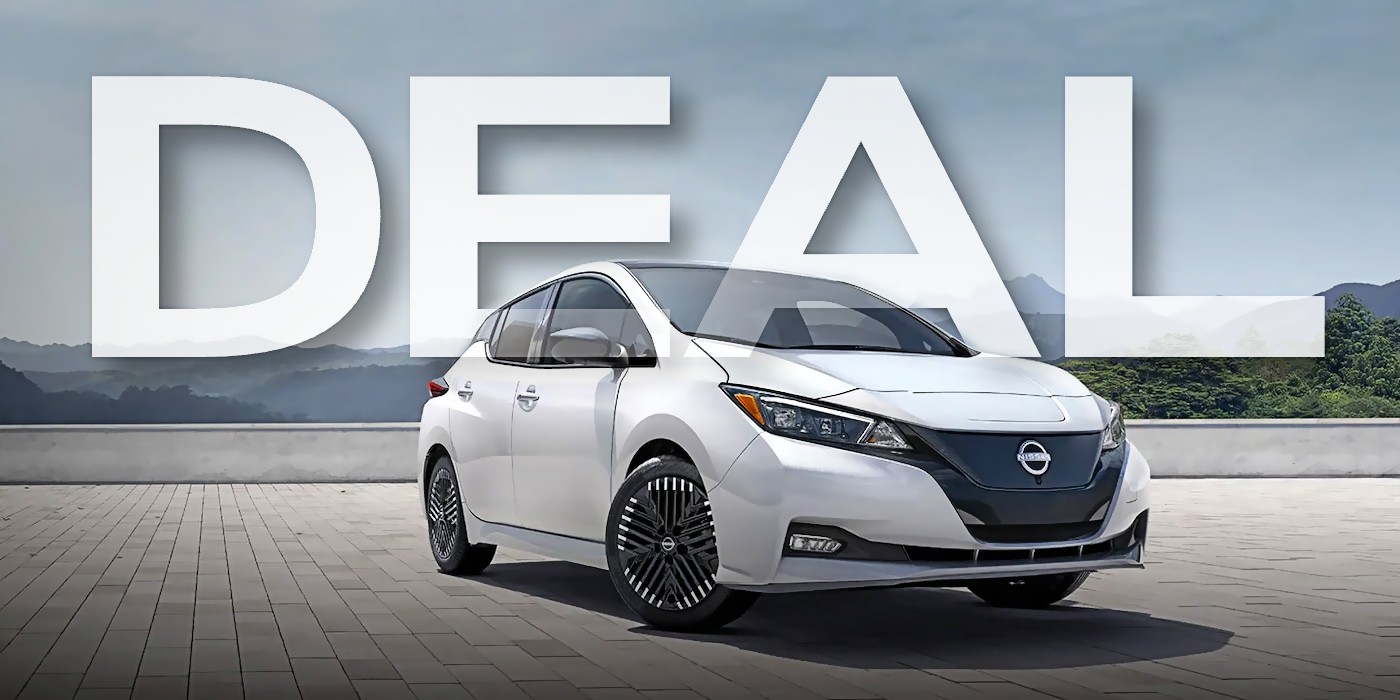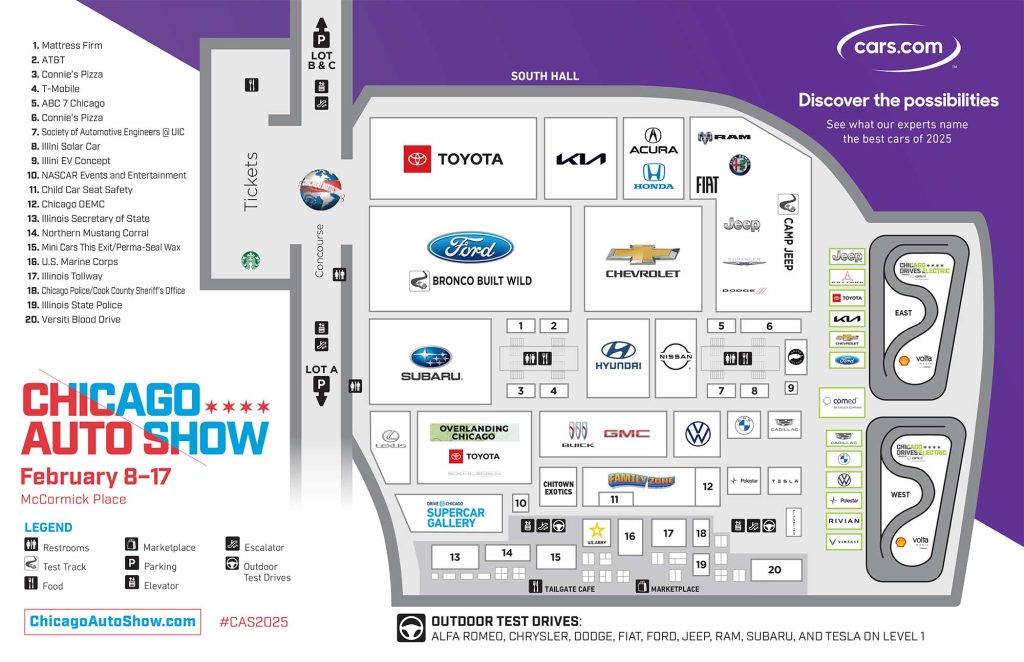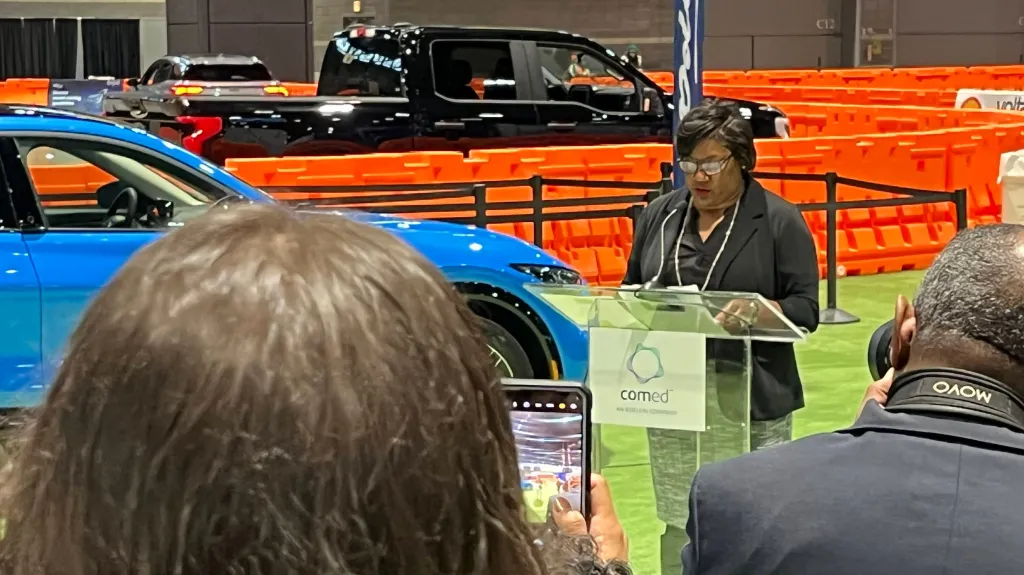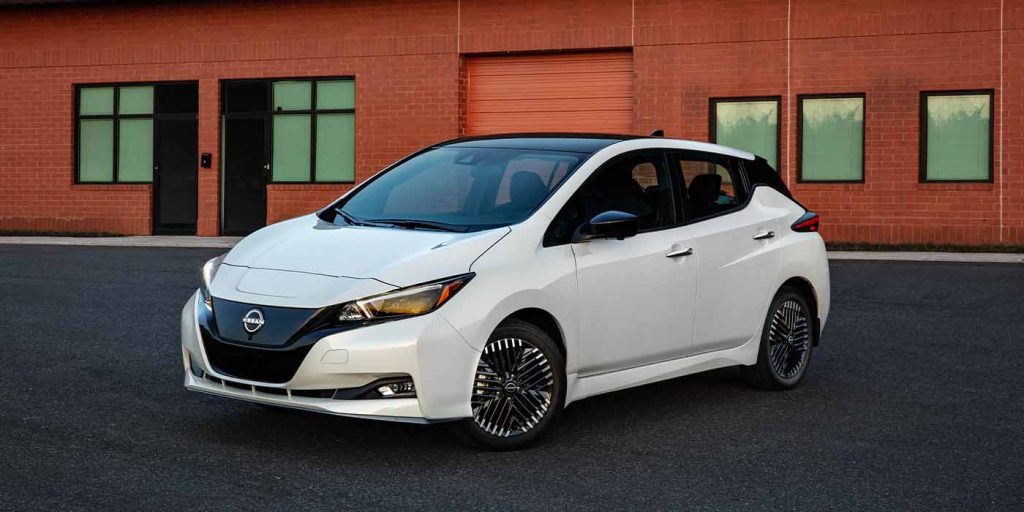
The 2025 Chicago Auto Show opened this week, and I’ve been struggling a bit with how to approach this story about the decline and fall of what was once the American auto industry’s premier commercial vehicle show – but one thing was absolutely clear: the Nissan LEAF is the best new car deal in Chicago. ***
Like any wild deal like this, there are asterisks and caveats. And (I promise) I will absolutely get to those. That said, I have some musings about the state of the Chicago Auto Show that I’ve shared, below, to sort of “set the stage,” if you will. If you want to skip those, you can can click here to get right to the nitty-grity on that 2025 Nissan LEAF deal, or simply click here to find a Nissan LEAF deal near you.
2025 Chicago Auto Show Map

If you have fond memories of the Chicago Auto Show from years past – and not even that many years past; like, pre-COVID years past – skip the 2025 show.
Once upon a time, the Chicago Auto Show occupied both main halls, with another hall housing commercial trucks and vendors, and drive activations outside and in the parking lot. Since that heyday, the show has shrunk significantly. It’s down to a single hall now. Depressingly, the show can’t even fill that with OEM displays, and has worked a number of vendors, drive events of both the EV and ICE-powered varieties, and even military recruiters into huge swaths of floor space. Despite the compacted nature of the displays, the show floor is not packed. You will be able to sit in any car you want, for as long as you want, with minimal chance of interruption.
I was lucky enough to be able to walk the show with my good friend and industry legend, Greg Lucia. Greg is best known for an iconic, gonzo PR stunt he pulled off while he was working at Toyota that involved the Space Shuttle Endeavour being towed to its final destination at the California Science Center in Los Angeles across the 405 freeway by a then-new Tundra.
Oddly enough, we both honed in on a specific year, 1997, as one that stood out.
“I had a part-time job at Sears while I was in college,” I told Greg. “I was making $9/hr. plus either 1% or 3% of everything I rang up. It worked out to a pretty steady $12/hr., and that money was good enough that there were a bunch of cars I could have reasonably bought. I ended up with a ’98 Dodge Dakota pickup. Manual. My payment was $218/mo.”
“Those were neat trucks,” he said. Adding, after a thoughtful minute, “I don’t think you could do that, today.”
Greg is obviously correct. Auto Shows have turned a corner. Instead of being someplace that any able-bodied person could go and, with a reasonable amount of effort and willingness to put in the hours, pick out a fun, dependable vehicle. In such an economic climate, it’s no wonder that the car you drove said something about you above and beyond what you could afford. Today, the closest thing to that mid-sized Dakota is probably the current Ford Ranger. The mid-sized Ford starts at $32,820 … but the average part-time mall job doesn’t pay any more than I made back in ’97. If anything, it pays less.
I wondered what possible value a traditional auto show could offer a college kid in 2025, when something like a base Ford Mustang that started at about $15,800 in 1997 has more than doubled to $31,920 and the cost of college has risen even higher, over 140% in the same interim, while wages have largely stayed the same.
Deeply entrenched in this gloomy mood, I plodded along between the relatively subdued Nissan and Volkswagen booths towards the ComEd presser (see the show map, above), that was already under way.
ComEd $100M commercial EV rebate program

ComEd chose the Chicago Auto Show to lay out the 2025 version of their beneficial electrification rebate programs that will offer customers access to $100 million (up from $90M last year) in funding opportunities designed to remove up-front cost as a barrier to widespread adoption of EVs and the expansion of charging infrastructure in northern Illinois. $53 million of that budget is earmarked specifically business and public sector customers, with up to $7500 available for each light-duty (Class 1 or 2) EV purchased by a ComEd commercial customer.
That was when it hit me: this is why local events like the Chicago Auto Show exist — to highlight deals that are unique to the area, that outlets like Motor Trend and Car and Driver and even Electrek (if we’re being honest) might overlook due to factors like geography, international audiences, or some other general lack of interest.
Allow me then, to explain how a parks district, or a police department, or a car sharing fleet, or a delivery fleet, or any other company, incorporation, or LLC in northern Illinois can score an absolutely killer deal on a Nissan LEAF.
Structuring that $9,140 Nissan LEAF deal

For 2025, Nissan’s groundbreaking LEAF S starts at just $28,140 before incentives. That’s already more than twenty thousand US American dollars less than the $49,740 average transaction price of a new vehicle recorded just last month. But $28,140, you’ll notice, is a lot more than $9,140. Here’s how we get there:
- Nissan themselves are eager to get these LEAFs off dealer lots to make room for the next-generation version. So eager, in fact, that the company is offering $7,500 in customer cash right off the bat.
- If you’re an Illinois resident, you could get another $4,000 from the state if you buy between now and April 30th.
- Finally, if you’re a ComEd commercial customer you can score a third rebate — this one good for up to $7,500 if you spend more than 50% of your time driving the vehicle in a low-income or “EIEC” area.
- Now, we do some math: $28,140 – 7500 – 4000 – 7500 = $9,140 … and that’s before any dealer discounts or negotiations come into play. (!)
For that $9,140 you get a smooth, capable EV with 149 miles of range* whose only real shortcomings are its relatively slow charging speed* compared to something like a Hyundai IONIQ 5, of course, the CHAdeMO charging standard* that every other brand has abandoned and for which precious few public charging options exist.
And, admittedly, those are three very real, very scary asterisks.
For a business, though? For a parks district or city official or lab courier or car share service that has some dedicated parking space to put their own charging into? That’s not as much of an obstacle as it might be to you and me. Heck, a young, ambitious college student who realizes they can fit a few robot lawnmowers under the LEAF’s spacious 23.6 cubic foot (668 liters) hatch might just find the money needed to start an LLC in Illinois and find any number of fun, expressive, practical news car they can actually pay off with a part-time hustle at the 2025 Chicago Auto Show after all!
That’s my take, anyway — you can get tickets to the 2025 Chicago Auto Show here, explore ComEd’s business and public sector EV rebate program here, then let me know what you think of all these musings (and whether or not you think I could get a few Automowers into the back of a Fiat 500e) in the comments.
SOURCES | IMAGES: ComEd, Nissan, the twisted mind of Greg Lucia.
FTC: We use income earning auto affiliate links. More.






Comments